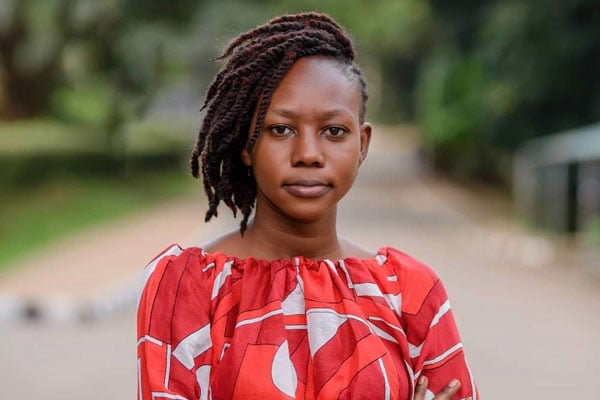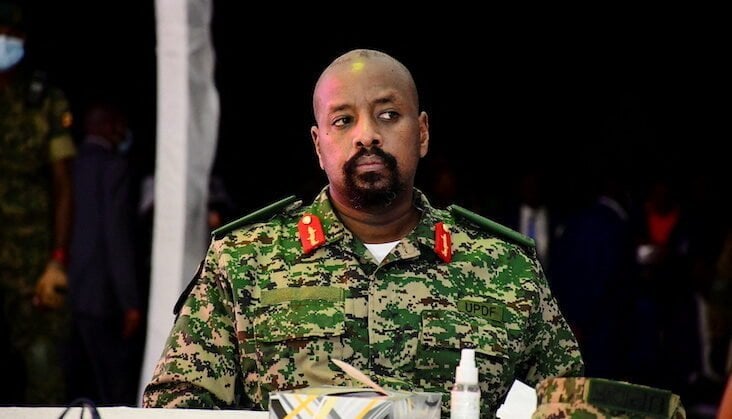Prime
Gen Muhoozi outlines next plans for youth

Gen Muhoozi Kainerugaba is welcomed by the leader of Team Chairman, Mr Micheal Toyota (with white cap), at Bombo playgrounds in Luweero District where he met his supporters on October 11, 2022. PHOTOS | ABUBAKER LUBOWA
What you need to know:
- The first son, now a four-star-general, made it clear that his number one mission will be interacting with the youth, understanding their concerns and crafting a harmonious working relationship.
The senior presidential adviser on special operations, Gen Muhoozi Kainerugaba, has outlined his plans for the youth after being stripped of the Commander of Land Forces role.
Gen Kainerugaba made the remarks in Bombo, Luweero District, shortly after being decorated as a four-star general at the offices of the Land Forces.
The soldier, who was pipped by his wife Charlotte Kainerugaba and his uncle Gen Salim Saleh (rtd), said last week’s removal as Commander of Land Forces had now given him time to interact with the youth.
“I am going to make it my number one mission to always interact with the youth of Uganda, we love you so much, you should be confident, this is your country you have a right to be heard and your interests will be taken seriously,” he said.
He added: “l will be meeting with you in the future and telling you more about how we are going to be working together”.
The function, which also saw Gen Kainerugaba hand over office to newly-decorated Lt Gen Kayanja Muhanga, was attended by the top leadership of the army, including Gen Wilson Mbadi, the Chief of Defence Forces.

Lt Gen Muhanga Kayanja is decorated by Gen (rtd) Salim Saleh and his wife. Right is Gen Wilson Mbadi, the Chief of Defence Forces.
President Museveni, who is the Commander-in-Chief of armed forces, last week promoted his son, Gen Kainerugaba, from the rank of Lieutenant General to General and dropped him as the boss of the Land Forces.
General is the highest rank in the hierarchy of Uganda People’s Defence Forces.
Army role
Gen Saleh, who presided over the function, said Gen Kainerugaba is better than him in handling troop deployments and specialised skilling of the Force.
Born Celeb Akandwanaho, the young brother to President Museveni is famed for his courage in the successful command of the National Resistance Army five-year guerrilla war.
Gen Saleh said Gen Kainerugaba was a teacher, organiser and military strategist.
“Gen Kainerugaba defeated me in one thing, you remember when mzee (Gen Museveni) almost took us to jail for miss deploying hellebores in Gulu, yesterday (Independence Day) I saw people skydiving and my heart almost went out completely, So we shall also remember you for that contribution of that specialised training which you and your colleagues did after us,” he said.
Gen Saleh also urged members of UPDF to understand the nexus between security and development which is ideal for the army to understand.
“I want to encourage the [Chief] of Defence Forces to have conversations with those guys because [they] are geniuses in their own right, remember I became a four-star general when I was 46 and you are 48, it means there are only two years,” he added.
Gen Saleh described Lt Gen Muhanga, the new Commander of Land Forces, as a soldier who knows what to do, saying the UPDF is to maintain discipline and ideological clarity because some of them are getting very old.
He said when he turned 60, he started evaluating what he had done in life.
‘‘Yesterday, I was thinking that Uganda is old enough to look after itself. For me at 60, which I was two years ago, I made a very serious blunder, I thought I had matured and knew everything, so I wrote a letter to the Commander in-Chief (2020) because I thought I had gone through all the troubles in life and became a stable man,’’ Gen Saleh said.
“In that brief, clarity on the goals and objectives and programmes of National Development Programme Phase III [is key]. I wrote what I thought were the firm foundations of the economic take-off. Out of the successes, most people contested those two; political and favourable agro-economic policies,” he added.






